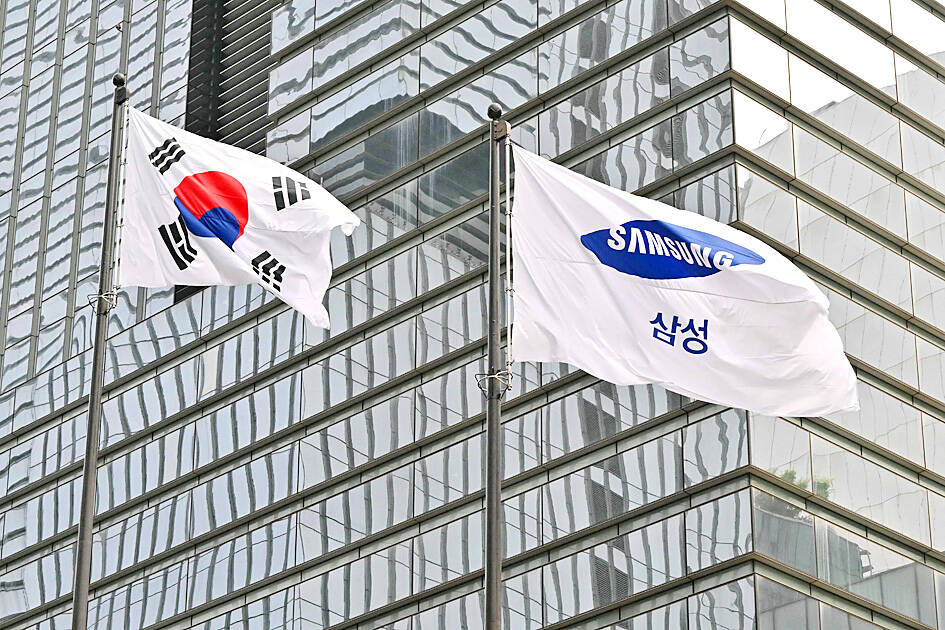South Korea would set up an aid package worth more than US$7 billion to support its chip industry, the South Korean Ministry of Economy and Finance said yesterday.
This initiative follows its pledge last year to build the world’s largest chip center using US$240 billion of private investment, primarily from Samsung Electronics Co, the world’s largest memorychip maker, as it seeks an edge in the global industry.
Seoul “is preparing an assistance package of more than 10 trillion won (US$7.3 billion) to support fabless, chips materials and manufacturing equipment in all areas of chips industry,” South Korean Minister of Economy and Finance Choi Sang-mok said in a ministry statement.

Photo: AFP
INVESTMENT
The US$7.2 billion package could be created through “a new fund financed by private and public financial institutions,” Choi told executives of domestic chipmakers at a meeting on Friday the statement said.
It comes as Asia’s fourth-largest economy aims to invest heavily in six key technologies including chips, displays and batteries, all areas where the country’s tech giants are well-established already.
South Korea is home to two of the world’s largest memorychip makers: Samsung Electronics and SK Hynix Inc.
Semiconductors are Seoul’s leading export and hit US$11.7 billion in March, their highest level in almost two years, accounting for one-fifth of South Korea’s total exports, according to figures released by the South Korean Ministry of Trade, Industry and Energy.
CRITICAL ISSUE
In May 2022, Samsung announced a 450 trillion won investment blueprint over the next five years aimed at making it a frontrunner in key sectors from semiconductors to biologics.
Securing supplies of advanced chips has become a crucial issue internationally, with the US and China locked in a fierce battle for control of the chips market.
Washington is pressing allies including South Korea to further tighten restrictions on China’s access to semiconductor technology. US officials also want South Korea to restrict the flow of equipment and technologies for making high-end logic and memory chips to China, Bloomberg News has reported.

When an apartment comes up for rent in Germany’s big cities, hundreds of prospective tenants often queue down the street to view it, but the acute shortage of affordable housing is getting scant attention ahead of today’s snap general election. “Housing is one of the main problems for people, but nobody talks about it, nobody takes it seriously,” said Andreas Ibel, president of Build Europe, an association representing housing developers. Migration and the sluggish economy top the list of voters’ concerns, but analysts say housing policy fails to break through as returns on investment take time to register, making the

‘SILVER LINING’: Although the news caused TSMC to fall on the local market, an analyst said that as tariffs are not set to go into effect until April, there is still time for negotiations US President Donald Trump on Tuesday said that he would likely impose tariffs on semiconductor, automobile and pharmaceutical imports of about 25 percent, with an announcement coming as soon as April 2 in a move that would represent a dramatic widening of the US leader’s trade war. “I probably will tell you that on April 2, but it’ll be in the neighborhood of 25 percent,” Trump told reporters at his Mar-a-Lago club when asked about his plan for auto tariffs. Asked about similar levies on pharmaceutical drugs and semiconductors, the president said that “it’ll be 25 percent and higher, and it’ll

CHIP BOOM: Revenue for the semiconductor industry is set to reach US$1 trillion by 2032, opening up opportunities for the chip pacakging and testing company, it said ASE Technology Holding Co (日月光投控), the world’s largest provider of outsourced semiconductor assembly and test (OSAT) services, yesterday launched a new advanced manufacturing facility in Penang, Malaysia, aiming to meet growing demand for emerging technologies such as generative artificial intelligence (AI) applications. The US$300 million facility is a critical step in expanding ASE’s global footprint, offering an alternative for customers from the US, Europe, Japan, South Korea and China to assemble and test chips outside of Taiwan amid efforts to diversify supply chains. The plant, the company’s fifth in Malaysia, is part of a strategic expansion plan that would more than triple

Taiwanese artificial intelligence (AI) server makers are expected to make major investments in Texas in May after US President Donald Trump’s first 100 days in office and amid his rising tariff threats, Taiwan Electrical and Electronic Manufacturers’ Association (TEEMA, 台灣電子電機公會) chairman Richard Lee (李詩欽) said yesterday. The association led a delegation of seven AI server manufacturers to Washington, as well as the US states of California, Texas and New Mexico, to discuss land and tax issues, as Taiwanese firms speed up their production plans in the US with many of them seeing Texas as their top option for investment, Lee said. The